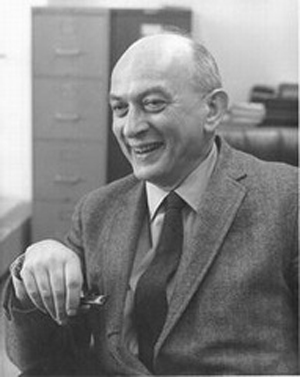
Solomon Eliot Asch was born on September 14, 1907 in Poland .He was a Polishgestalt Psychologist and pioneer in Social Psychology in United States. Asch established work in impression formation, prestige suggestion, conformity and other topics related to social psychology. Asch generally follows on common theme Gestalt psychology because it alters the functions of personality. Asch quoted a statement "Most social acts have to be understood in their setting, and lose meaning if isolated. No error in thinking about social facts in more serious then the failure to see their place and function" Solomon Asch is famous and known person in conformity experiments which describes about psychology in nature. Asch was ranked as 41st most cited psychologist of 20th century for his "Review Of General Psychology" survey published in 2002.
EARLY LIFE:
Asch was born in Warsaw, Poland to Jewish family. He grew up in a small town named, Lowicz. In 1920, at the age 13 Asch moved to United States with his family. In United States they lived in dense area surrounded by Jewish, Italian people. His friends call him Shlaym.
EDUCATION:
Since Asch was new to United States he was not able to speak English fluently. It was a difficult time for Asch and he learned English by reading Charles Dickens. Later Asch joined High school in City College of New York. He was interested in psychology at the end of undergraduate by reading William James work and other scholars. At the age of 21, he was awarded Bachelor of Science.
Asch continued his graduate at Columbia University. He was interested more in anthropology than in social psychology. With the help of his friends he achieved in summer membership and enquired the culture of children. Later he received PhD in 1932.
Asch explained to Gestalt psychology through Gardner Murphy, a member at Columbia. Later he became interested in Gestalt psychology after meeting Max Wertheimer and later Asch was friend with him.
FAMILY LIFE:
Florence Miller was married to Asch at 1930. The couple lived a happy life and reported as "Easy, good - humored". They had only one child named, Peter. At Rutgers University Peter Asch became a professor of economics, he was married to Ruth Zindler and had two sons named Eric and David. Peter died at the age of 52 due to heart failure.
CAREER:
Asch stared his teaching career at Brooklyn College. He moved to Swarthmore College and stayed for 19 years. At that time Swarthmore was famous for Gestalt psychology. Asch continued his teaching career in psychology and retired at 1979.
IMPRESSION FORMATION:
Asch was basically interested in impression how humans form and express it. He felt easy and was absorbed the form of impressions though we have complex structures. Asch concluded "to know a person is to have a grasp of a particular structure".
Impressions with following elements:
*It is an organized process.
*The characteristics are perceived differently in relation to other characteristics.
*Central qualities are discovered, causing a distinction between them and peripheral qualities
*Relations of harmony and contradiction are observed.
Later he proposed characteristics of forming an impression:
Group A: intelligent-skillful-industrious-warm-determined-practical-cautious.
Group B: intelligent-skillful-industrious-cold-determined-practical-cautious
NOTABLE INFLUENCES:
Stanley Milgram was adviser for Asch and Milgram completed his essay about national differences .Asch was also influenced by many theories and other social psychologists.
LEGACY:
Asch research led to critical ideas towards research .First, Asch believed that social interaction reflects the ability of people as a group or individual, viewpoints as themselves or others and group members. This viewpoint illustrates important theories from many works of social psychologists.
Second, Asch emphasized that thought and disagreement among others is a base for group functioning. By setting differences between others is capable to understand the drawback of our beliefs.
CRITICISM OF ASCH'S WORK:
Some of the research scholars argued that Asch's conformity works are not clear cut as they appeared. For example, John Turner points that the experiments of Asch were uncertain and unsure of the correct one.
DEATH:
Asch died at the age of 88 on February 20, 1996 in his home in Haverford, Pennsylvania.




